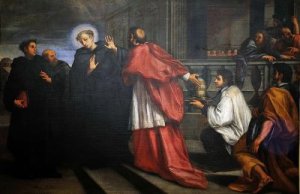
Feast Day is August 23
Philip was born into the noble Florentine family of Benizi at the beginning of the thirteenth century, around the time of the founding of the Friar Servants of the blessed Virgin Mary. He studied both medicine and theology. The love of God was very strong in him, so that he fulfilled the divine law to perfection, by self-discipline, bringing help to the poor of Christ, praying, and particularly by reciting each day the office of the Holy Virgin.
At a certain point he felt drawn to leave aside the joys of the world and to enter the service of the Lord; he was in the church of the Servants in Florence on the Thursday after Easter, and he heard the scripture text, “Philip, go and join yourself to that chariot.” He took these words as applying to himself, that he should join himself to the chariot of the glorious Virgin, namely, the religious fraternity of the Servants. And so, he applied to the local prior, Bonfilius, and asked in all humility if he might take the habit of a brother in the religious order. This he did, but it was the Lord’s wish that his wisdom as seen by his brothers should lead him to accept the priesthood.
In the year 1267, in the Order’s General Chapter of Florence, Philip was elected prior general, an office he held for eighteen years, almost to the time of his death, in spite of frequent humble requests on his part to be relieved of it. He was a good pastor and a faithful Servant of Mary. He watched over the Order of Our Lady with great care, in both its doctrine and its holiness. Like a father he would visit all the communities making long and arduous journeys. By a miracle, on one occasion, he brought food to the friars of Arezzo; their district had been laid waste by war and great famine, and at Philip’s prayers to Mary the Mother of her Servants, food was provided.
He was responsible for an increase in the number of communities and provinces in the Order, and he helped to draw up, complete and publish Constitutions through the work of chapter meetings. When the Second Council of Lyons decreed the suppression of the Order, Philip applied his great gifts of wisdom in the Roman Curia along with Blessed Lotharingus and succeeded in preparing the way for definitive approval of the Order in the Church. For this reason, Philip is often called a holy Father of the Order. As follower of the Apostles, he was tireless in proclaiming the word of God, and worked frequently for peace in disturbed cities. He drew many from worldliness to a life of great perfection, and many came to follow the same way of life he himself lived.
There was a leper once who was healed by touching Philip’s garments. Some of the saint’s miracles became so well known that, when the reigning pope died, a number of cardinals suggested that Philip should be his successor as Supreme Pontiff in the Church. It is also told how his fatherly kindness and persuasion drew two sinful women from their former lives to the love of the Virgin Mother of God; the Holy Spirit’s conversion of them led them to great sanctity.
On the octave day of the Assumption, 1285, having received the holy sacraments, and comforted by the presence of Blessed Ubald, Philip addressed his brothers exhorting them to greater charity, and clasping tightly the crucifix of the Lord which he frequently called his living book, Philip died in the priory of Todi. His body was subsequently moved on a number of occasions, but now rests in the church of Santa Maria delle Grazie in Todi where it is devoutly honoured. Philip was included among the saints of the Church by Pope Clement X in 1671.
Copyright © CURIA GENERALIZIA OSM, Piazza San Marcello, 5 – Roma

You must be logged in to post a comment.